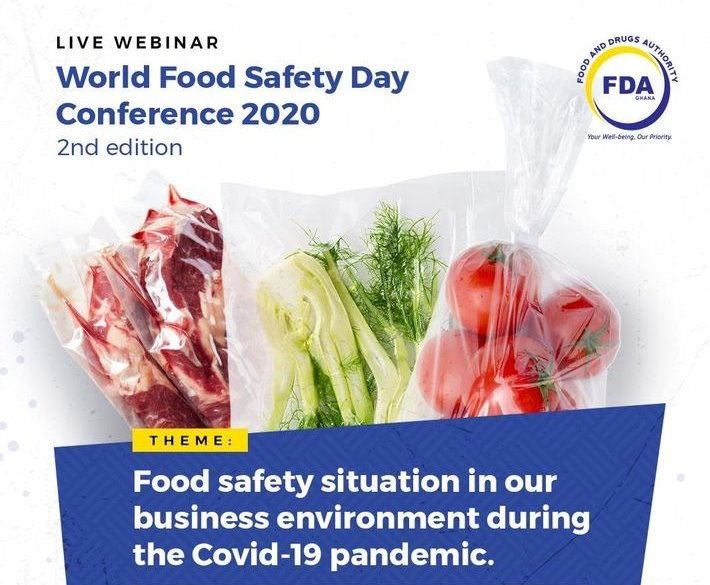“Food Safety Can Prevent Foodborne Illnesses, Boost Body’s Immune System To Fight COVID-19” - FDA
- Think News Online
- Jun 9, 2020
- 4 min read
Updated: Jun 10, 2020

Deputy Chief Executive, Drug Registration and Inspectorate Division at the Food and Drugs Authority (FDA), Seth Seaneke is calling on the public to adapt the practice food safety in their daily lives adding that it can help prevent foodborne illnesses and boost the body’s immune system to fight COVID-19.
According to Mr. Seaneke, the COVID-19 pandemic has resulted in food supply chains being disrupted with some products, ingredients, or materials being unavailable or in short supply.
Delivering a speech on behalf of the Chief Executive Officer (CEO) of FDA, Delese Mimi Darko in a virtual presentation at the 2nd World Food Safety Day on the theme, ‘Food Safety, Everyone’s Business’, Mr. Seth Seaneke said “In the rush to identify new suppliers, food businesses may focus less attention on the integrity of the supply chain, thereby compromising on food safety and food fraud. In this respect, every stakeholder along the food chain in Ghana has a key role to play towards achieving the ultimate goal of food safety and sustainability”
He added that in a world where unsafe food accounts for 600 million morbidity and 420,000 mortality every year (WHO), there is the urgent need for action as SDG 3’s ‘Ensure healthy lives and promote wellbeing for all at all ages’ is to be achieved.
Mr. Seth Seaneke also added that access to sufficient amount of safe and nutritious food is key to sustaining life and promoting good health.
Speaking on ‘Food Safety in Our Business Environment During this COVID-19 Period’ he explained that the FDA on its part has reviewed its operations to reduce the negative impact of the pandemic on business whiles still ensuring the safety of the food supply chain.
“The FDA is therefore working with the food industry to ensure the prevention and spread of COVID-19 in order to forestall any potential food safety and nutritional challenges that may arise. Continuous education and food safety awareness is on-going via our social media handles to equip everyone in making informed choices whiles improving their health via the consumption of safe food” he added.
The Deputy Chief Executive, Drug Registration and Inspectorate Division also mentioned that the fast track registration of hand sanitizers and face masks has also been introduced in the effort to ensure their availability to all Ghanaians.
On his part, the Head of Food Industrial Support Services Department at the FDA, Ebenezer Kofi Essel said “COVID-19 presents challenges to virtually every human activity. The socio-economic impact is very grave and may linger longer than anticipated. The protocols recommended for the prevention of infection with COVID-19 has itself put a strain on major statutory activities including food regulation across the food supply spectrum worldwide”
He explained that a major pursuit expected of every National Food Regulatory Agency during this period is the intensification of measures that would ensure the continuous supply of safe and nutritious food.
Mr. Essel further mentioned Inspections (Local and Foreign), Market Surveillance, Import Controls and Laboratory Testing as part of the concerns infections resulting from exposure to the virus have had on some existing regulatory frameworks.
Speaking on the impact of reduced regulatory activities, he said “Absence or reduced regulatory control during this period could potentially put consumer health and safety at risk. Increased risk of Food Fraud. Increased risk of compromised hygiene practices in food processing facilities leading to food contamination
Touching on challenge facing the Food and Drugs Authority, Mr. Essel said “How do we continually assure public health and safety; without exposing our staff to the infection, letting down our guards to food fraudsters, compromising safe food handling practices and injuring public trust and confidence in our food supply system?”
He, however noted that reviewing existing regulatory frameworks and situating them in the context of the pandemic which is guided by recommended protocols for fighting COVID-19 is one of the point strategies and innovations to address FDA’s challenges.
“Assessing the national food safety situation in the light of regulatory coverage along the food supply chain, Identifying the weak links, looking at how those links can be strengthened and considering new collaborations that needs to be established including laboratory testing facilities, possibly the use of private inspection entities are part of the point strategies and innovations to address FDA’s challenges” he said.
Mr. Essel also revealed that putting together a comprehensive data on Food Businesses to facilitate risk categorization of operations such as; Risk profiling attention and resources have been realigned to operations classified as medium or high risk.
He also explained that eased regulatory bureaucracies and administrative bottlenecks which do not necessarily enhance public health, rather discourages self-compliance.
Mr. Essel highlighted the need to intensify media interactions including public education on food safety and consumer awareness; traditional and largely social media.
“Making conscious efforts to deal swiftly and decisively with issues of regulatory infractions, being mindful not to create panic situations but rather demonstrates to the public that FDA is still in control” he stressed.
The Head of Food Industrial Support Services Department at the FDA noted that Management of FDA is showing high level of competence, commitment and leadership to overcome the challenges COVID-19 and the threat it presents to food control systems.
Story by: Joshua Kwabena Smith








Comments